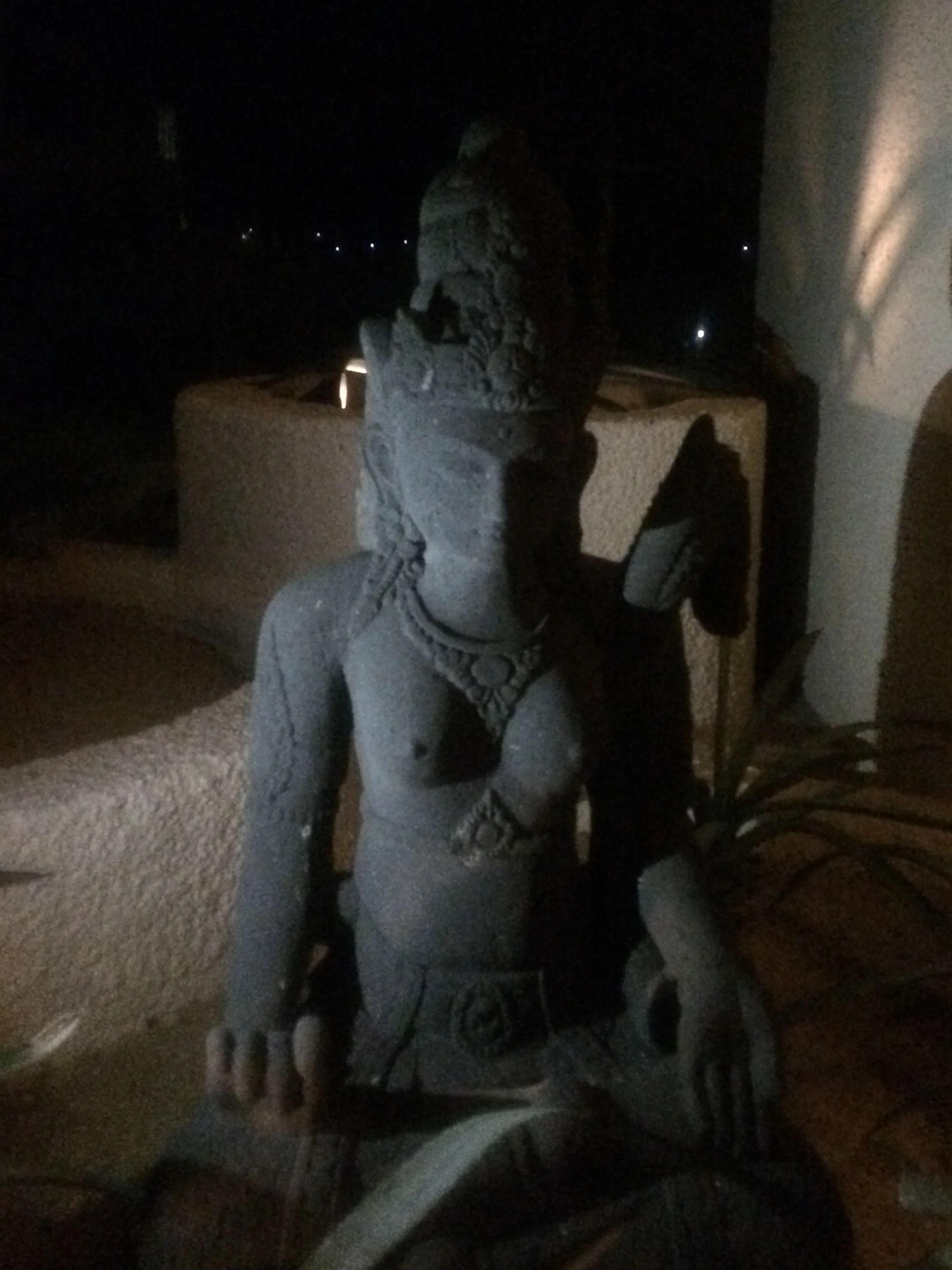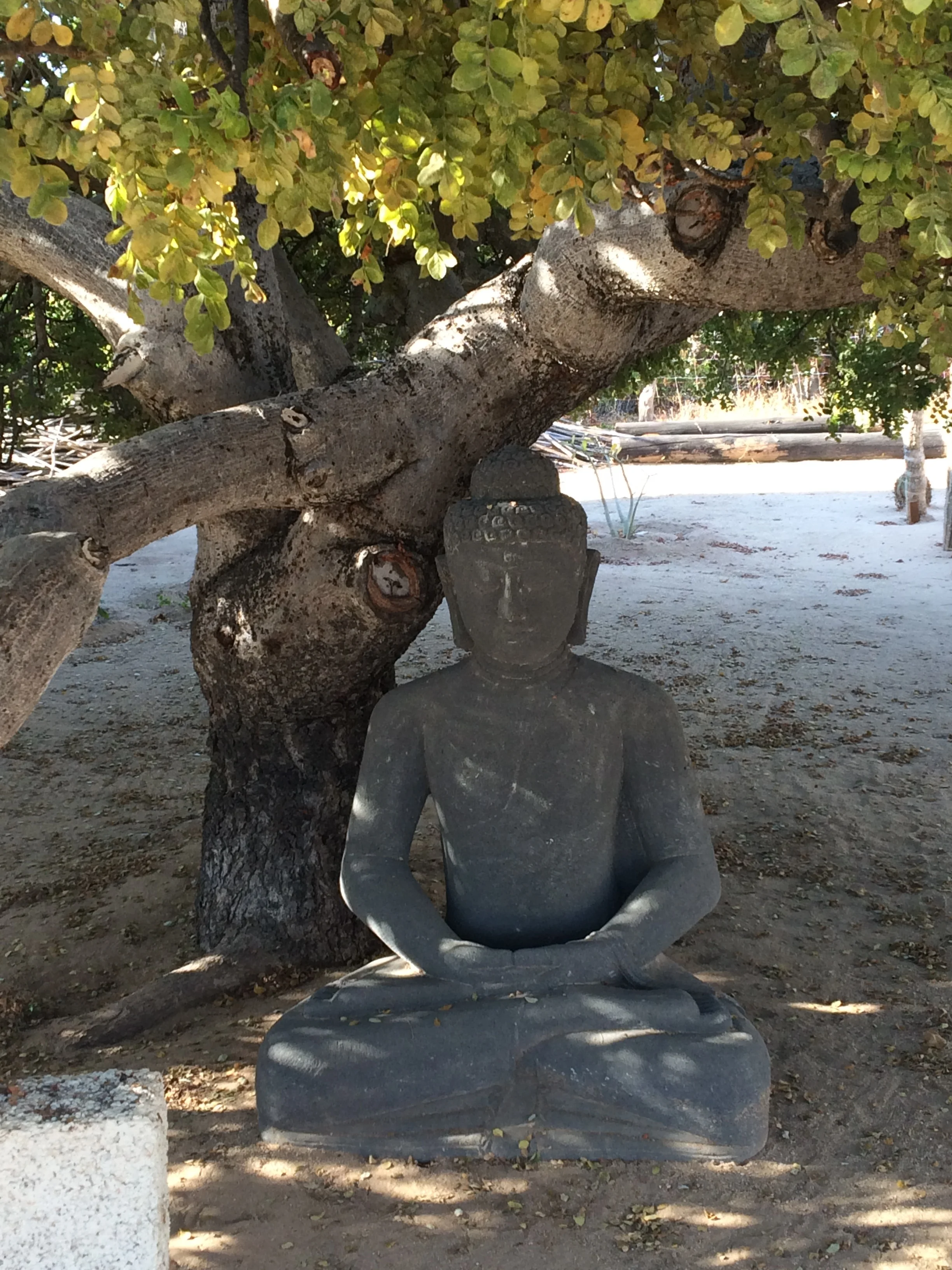Working on building a new habit, and I want to invite you to join me! Stay tuned...
scenes from a Baja yoga retreat
Winter Break
Left side: what I wish I could take to read on vacation. Right side: what I'm actually taking to read on vacation.
For the first time since I moved back to Chicago, I am doing th brilliant thing and escaping the winter! I plan to do some asana, some sitting, some reading and writing, and get some sun on my face. Hope to bring back good energy and thoughts to share.
Stay warm and nourished!
Yogi-as-Saboteur
Under the Green Line, 11th St., Chicago circa 2014.
I recently read an article about yoga and appropriation that left me troubled. On paper, it sounded right up my street. Written by a yoga teacher in Florida, it offered suggestions on how to make sure that in your practice of yoga (not just asana), that you're honoring "the roots" of the practice. It was a great effort, but I felt the advice on avoiding cultural appropriation was a little too light for my taste. "A little humility, a little reverence, goes a long way", she writes. Yes, absolutely true. But what the hell does that mean? The further I read into the post, the more I realized I was frustrated because I felt the advice was vague, and I wasn't sure about the context from where it was coming.
It took me a lot of digging in corners corners of the internet to discover that the writer identifies--at least in one particular post--as an Indian woman. But the writer didn't mention their identity in the context of the advice. I wondered, why--on a blog on their own website (and also in the Huffington Post), in a discussion about the appropriation of a practice deeply connected to identity and nationality, that has been colonized and arguably appropriated by the majority culture-- why did the writer not identify as a person of color, and as an Indian woman specifically?
I mean, if I give this even a minute of thought, I can throw up guesses at why. Sometimes wearing a specific label in the public discourse of a specific context can get you questions you don't want to answer, get you ignorance you don't want to tolerate. Coming out as an Indian woman in a conversation about how not to culturally appropriate yoga might mean getting comments like, "Does tantric yoga really give you multiple orgasms?" or "What's up with that red dot on the forehead?" Right? and that's just the low-hanging fruit: I have no idea the ignorant shite that actually gets said to Desi folk who move in the context of yoga in the West. But I bet it would make me angry.
As someone whose identity sometimes puts me on the margins in certain communities, I hate it when I'm asked to speak for the sub-culture I'm part of (depending on the conversation it changes), and it happens so easily. In my new favorite podcast, the two hosts were fielding questions from white listeners addressing the idea, "How can I, as a white person, be an ally to people of color?" Their answers were so thoughtful, and not a little impatient at having to answer the question AGAIN, and you should definitely listen to the podcast, but it boiled down to: Don't be ally, do ally. Read a book. Then read all the books.*** Talk to your people who aren't doing this right, or who aren't doing it at all. Keep your mouth shut and listen as often as possible. People of color are tired of talking the talk to folk who don't and won't listen; white person, you wanna be an ally, stop worrying about the label, pick up your knapsack of privilege and use it to create some justice in our world.
So maybe the writer didn't self-identify in her space as Indian because she doesn't want that part of her identity to encompass how she's working in that context. Or maybe they thought it wasn't relevant to do so. Or maybe there's some element of what's happening in cultural appropriation that this conversation is missing sight of.
I don't have the luxury of choosing whether or not to identify. There are definitely times when I feel I can manipulate my racial identity--code switching, anyone?--but I don't forget about it, and in the world I travel from day to day, it's always there: an indivisible part of me from which I'd never want to separate. I feel a responsibility to bear witness to my experience, and out of it, to work for a world I actually want to be around for. My experience is complicated, hard to quantify, and it's also black, it's woman, it's cis: I cannot do otherwise. In spaces that are working to raise consciousness (and sometimes in spaces that aren't), I feel an expectation that marginalized folk who step to those spaces are at most eager, but at least willing, to identify. I need us to be seen, to take up space and not to shrink from what we need to say or do.
So I read this post I mentioned earlier, a kind of "How Not to Culturally Appropriate", and then I read this piece, positing cultural appropriation as a symptom of our world's systems of privilege and oppression. It was fresh and insightful and smart and so powerful. It hit the notes that I think I was seeking in the other piece: a clear, penetrating look at the real damage appropriation does, and a challenge to tear down our own moments and actions of appropriation by seeking to destroy the systems of oppression that exist in our world.
“Like so many other systemic problems—police brutality, say, or a lack of diversity in film and television—cultural appropriation is a symptom, not the cause, of an oppressive and exploitative world order. And yes, these symptoms do reinforce the systems that created it (police brutality will reinforce the supremacy of Whiteness through fear and violence, therefore helping to enable more police brutality), but ridding society of any of these individual factors does not touch the systems of oppression that created it.”
So what are the systems of oppression in the yoga community? Drop-in and package prices that are prohibitively high? Studios that are inaccessible to the differently-abled? An absence of gender-neutral restrooms or changing rooms? Adjustment without consent? Using tools of worship as adornments of fashion? These are just the ones that I can see with my teeny vantage point; some of them, that I sometimes feel, are harder to articulate, and harder to wrestle with and uproot. How do I talk about the oppression that creates a space where I as a person of color feel both indelible and invisible at the same time, while I also feel at home in my asana practice? How do I talk about it so others will hear me? How do I reckon with the idea that teaching--an act which, at least in our society, inherently creates a kind of top-down, expert-novice, student-teacher dichotomy--requires me to share experience and information in a way that is grounded in a spiritual practice (yeah, I said it), that is not a part of my national or cultural heritage? How do I dismantle and transgress the classroom context so that I am not the expert in the room, but instead a servant to the students, and a compassionate, guiding witness in their individual and collective work?
This conversation about appropriation in the culture of how I do my life's work, how I earn my rent, how I serve--and initiate change in--my community by using a practice that feels at once mine and not-mine, well, it's a conversation I have with myself over and over. If I'm lucky, I occasionally have it with other yogis and teachers who are down for the cause as well, and if I'm doing my job, I have the conversation worth yogis and teachers who aren't down--this is harder but it matters. I get so excited about using yoga as a tool to dismantle the patriarchy, as an agent of subversion for the good of humanity. I don't think yoga is a rising tide that lifts all boats; I don't think that every class we go to is going to raise consciousness and pursue/manifest justice and healing for all. But I think when we decide that our practice as teachers and students is also to subvert, to dismantle, and not to just open hamstrings and calm breath, we can begin to practice and to teach without appropriation. When we engage yoga as a tool of crumbling systems of oppression and equalizing systems of privilege, we can heal institutions and not just bodies.
P.S. In the midst of drafting this, I watched Beyonce's "Formation" video and read a little bit about it, and I also watched that Coldplay video, "Hymn for the Weekend." Quite the spectacle in both, and talk about exploitative world order: It gave me a cultural appropriation headache. The best thing I read about it is here.
***Also, ohmygourd, in NO WAY, is this list exhaustive. There are so many I would add, not singularly in terms of black feminist education, but in consciousness raising. Maybe I'll put together a list in another post...
#yogalife
Y'all ever had a good look at the Instagram hashtag yogalife? I had a look recently, and what I saw was a bunch of mostly thin, mostly white, mostly cis-female bodies in advanced asana, assuming an expression of jubilation at having achieved a pose, or one of quiet internal reflection, indicating to me as the viewer that this is a pose that brings them into great peace and stillness.
So it would be really easy for me to bag on this sub-community, for me to express my concern for folk who seem married to showcasing the fruits of yoga as a headstand in their kitchen or a seated backbend on the curb at a taxi stand. I mean, hell, maybe the only place a yogi can practice is in his kitchen; maybe a yogini was struck by a wicked cramp while waiting for a ride, and just had to assume ekapada rajakapotasana in a sports bra and Victoria's Secret leggings in order to find relief. Part of me thinks that there are only two things keeping me from wading into that posture-selfie pond: the fact that I don't have a handy iPhone stand to take a great photo, and frankly, I don't know how many advanced backbends or inversions I can do! If I ever photographed or videoed my practice, I bet I'd be pretty humbled with the results.
It's easy to get caught up in the beauty of the physical practice, and the yoga industry here in the west has done a fine job of stripping the spiritual practices, the practices that don't photograph so well, out of yoga. You'll never see someone posing in an Athleta catalog showing off their pratyahara: not when they're trying to sell you hundred-dollar pants, anyway. But what if you could? What if you could showcase your practice of contentment, or of moderation, of conservation? What if you could capture an image that would illustrate your truthfulness in such a way that it motivated someone to pursue honesty in their own practice and their own life? Would that still be a picture of adho mukha vrksasana?
In a class with Elesa Commerce once, she taught us about the practice of using our mat as a home for walking meditation, not just seated. She invited us to imprint the word peace on the sole of each foot, and to imagine that we were imprinting the word onto the earth with every step we took. I'll never forget that; it really made sense to me to think of taking every step in peace, toward peace. Sometimes, when I need students to transition on their mat, I ask them to do so in this way.
I've also been thinking a lot about Bryant Terry. (Incidentally, he's part of the reason I became vegan.) In a demo he did at my alma mater a few years ago, he talked about being in a history PhD program in New York, and doing lots and lots of yoga. He didn't talk about whether or not he could drop back into Urdva Dhanurasana from standing; but he did talk about the revelation that his life shouldn't be spent in academia, but instead should be spent in changing hearts, minds, and communities through cooking. Yoga, he said, was part of the catalyst that helped turn him on to his professional path, and arguably his life's path.
That's not a story I hear told about yoga very often. I hear stories of physical change, of healing, of joy and surprise. I also hear stories of injury, of body dysmorphia, of lack of consent, of maladjustment and damage. But I get really excited when I hear folk talk about what yoga does in a space not governed by asana.
I remember someone saying to me once that he didn't do yoga because it took away his anger. That has NOT been the case for me: I get just as angry as I ever did. But letting go of it feels a little easier than it used to. Of course, having a yogalife doesn't make choices or relationships any easier at all. I still fall into the same dangerous patterns I always have--of control, of condescension, of thinking I can do it all--so when I fall into these samskaras, yogalife makes me kinder to myself, more compassionate and forgiving, and less demanding.
I don't know if I can take a lot of pictures of the moments of my life that feel like yogalife moments. Sure, I could try to find a way to photograph myself in asana. But how do I take a picture of the thought process that leads me to choose to prioritize a lifestyle choice of sitting and breathing over one of watching TV? How do I snap the feeling I get when I ask my friends for help and they rally to show up for me? What's the hashtag for stillness and self-reflection?
Sometimes I feel like I want to say to some voice inside my head, "yoga is not my whole life, you know!" But maybe that's not true; maybe it's just asana that's not my whole life. Yoga is the thing that leads me to the work I do outside of the studio, meeting people in places of personal responsibility, facilitating awareness, education, and healing. Yoga leads me to a plant-based lifestyle. Yoga encourages me to be vulnerable with others, and to release expectations from our interactions.
I think that maybe the practice is showing up. The rest is just details.














